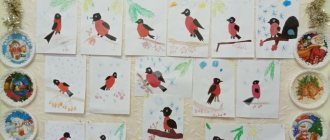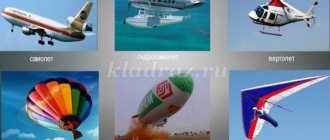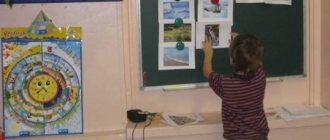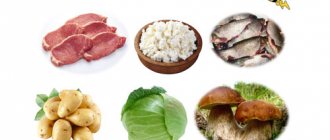JOURNEY INTO THE WORLD OF NATURE
Borisova Evgenia Alekseevna teacher MBDOU DS No. 72 “Watercolor” Starooskolsky urban district
JOURNEY TO THE WORLD OF NATURE summary of a lesson on cognitive development in a preparatory group for school
Objectives: to identify the volume of ideas and knowledge on this topic;
- consolidate and deepen children’s understanding of the flora and fauna of the forest: trees, insects, birds, plants;
- consolidate the ability to distinguish between animals and birds, group, and establish cause-and-effect relationships between various natural phenomena;
- to cultivate in children a humane attitude towards all living things, a sense of mercy; teach correct behavior in the natural environment, lay the foundations of an individual’s economic culture;
- improving the grammatical structure of speech - the formation of relative adjectives (birch catkins);
- promote children’s understanding of various aspects of human interaction with nature;
- develop children's cognitive activity.
Preliminary work : reading fiction; conversations about the forest and the life of animals and plants; viewing illustrations; didactic games “Who are we?”, “Where does it grow?”, “Which tree does the leaf come from?”; excursions to the park and forest.
Equipment: cards for didactic exercises - “Take care of nature”, “Which tree does the fruit come from?”, “Wintering and migratory birds”, “The odd one out”, “Horns, hooves, teeth”.
Advertising message
Progress of the lesson:
Today we will go on a journey into the natural world. Nature is of great importance in the life of every person. She gives something without which it is impossible to live.
- And what exactly will the riddles tell you:
Well, which one of you will answer: it’s not a fire, but it burns painfully, It’s not a lantern, but it shines brightly, It’s not a baker, but it bakes. (Sun)
Can a person live without sunlight and warmth?
It passes through the nose into the chest and goes back. It is invisible, and yet we cannot live without it. (air)
Can we live without air?
A sweet flashlight winked at you furtively from the grass. (berry)
It stood on a strong leg, now it lies in a basket. (mushroom)
The housewife flies over the lawn, fusses over the flower and shares the honey. (bee)
Its clean silver back shines in the river. (fish)
Sun, water, air, berries, mushrooms, bees, fish, and all this is nature. Man lives in nature, human life depends on nature. What do you guys think, does the beauty of nature depend on humans? Does man always help nature?
- Didactic exercise “Take care of nature.”
The teacher hands out pictures to the children depicting problematic situations in nature, the children must tell them how to do the right thing.
Our journey continues into the forest. There are many different trees growing in the forests. Do you know their names?
- Didactic exercise “Which tree does the fruit come from?”
Children receive cards with pictures of trees and find a card with a picture of a tree fruit. Name the tree and the fruit.
We ended up on bird island. Two flocks of birds live here: wintering and migratory, but they are all mixed up. Let's get things in order.
- Didactic exercise “Wintering and migratory birds”
Children receive cards with pictures of different birds. Children with cards depicting migratory birds go to the inscription “Migratory Birds,” and those with cards with images of wintering birds go to the inscription “Wintering Birds.”
There are a lot of insects on this island.
- Sedentary game “Flies - does not fly”
The teacher names insects (bee, bumblebee, wasp, fly, dragonfly, chafer butterfly, mosquito, moth, etc.) and other non-flying animals and insects, and children should raise their hands up only when the teacher names a flying insect.
Our journey continues through the Valley of Animals.
- Didactic exercise “The fourth odd one”
There are cards with pictures of four animals on the easel; children must indicate who is the odd one out and why.
- Didactic exercise “Horns, hooves, teeth.”
The teacher suggests selecting cards with images of wild animals. Gives the task to tell how animals protect themselves from enemies in the wild.
Our journey into the natural world has come to an end, but this is only today, because many more exciting journeys await you. Just don’t forget the most important thing - take care of nature, it is our wealth.
The material is published in a printed collection
“Preschool and primary education - modern methods and technologies of training and education” February – 2019
Lesson summary for the preparatory group “Planet Earth”
GBOU Secondary School No. 10 Kinel structural unit kindergarten "Luchik", Kinel, Samara region
Senior teacher
Link to the article, when indicated in the bibliography (according to GOST R 7.0.5–2008):
Ladina R.S. Lesson summary for the preparatory group “Planet Earth” // Sovushka. 2021. No. 2. URL: https://kssovushka.ru/e-sovushka.2016.n2-a/VP16030043.html (access date: 12/19/2021).
Priority educational area: “Cognitive development”. Integrated areas: “Speech development”, “Socio-communicative development”, “Physical development”, “Artistic and aesthetic development”. Goal: To give children an idea of the uniqueness of planet Earth. Develop cognitive interests and the need for independent search activities.
| Integration of educational areas | Tasks |
| "Cognitive Development" | To form an idea about planet Earth, about the living conditions on Earth. Through search and cognitive activity, identify and consolidate the properties of air and water. Develop logical thinking, visual memory, holistic perception and voluntary attention. |
| "Speech development" | Develop coherent dialogic and monologue speech. Induce speech activity in a child through play. Foster love and interest in the artistic word. |
| "Social and communicative development" | Foster a sense of pride in your planet Earth. To develop children's environmental awareness and to instill a desire to protect their planet and nature. Teach children to think, justify their opinions, formulate and summarize the results of experiments, interact with each other and with adults. |
| "Artistic and aesthetic development" | To form an aesthetic attitude towards the surrounding world, the natural world. Perception of music and fiction. |
| "Physical development" | Develop coordination of movements, attention, speed of reaction. Relieving emotional stress. |
Methods and techniques: visual, verbal, practical. Types of children's activities: gaming, communicative, cognitive-research, musical-aesthetic, perception of fiction. Preliminary work: looking at a map, globe, reading fiction and scientific literature, watching presentations and videos on the topic. Materials and equipment:
- globe
- Subject pictures depicting the Earth in outer space and rules of behavior in nature.
- Audio recording of the sounds of nature (the sound of the sea), space music, the song “Native Earth”
- Transparent glasses with water in quantities corresponding to the number of children.
- Cocktail straws in quantities corresponding to the number of children.
- Strips of light paper (1.0 x 10.0 cm) in quantity corresponding to the number of children.).
- Two containers: one contains ordinary water, and the other contains sea, salty water
- A raw egg
- Spoon
- Laptop
- Costume for an alien
Logic of educational activities
Educator:
Hello, golden sun. Hello, the sky is blue. Hello, free breeze. Hello, my dear friend. We live in the same region, I greet you all. Educator : Guys, I’ll now tell you a riddle and you’ll find out what we’re going to talk about today: The planet is blue, Beloved, dear, It’s yours, it’s mine, And it’s called... (earth) Children: Earth. Cosmic music sounds and an alien flies into the hall : “Hello, I flew from Mars, it’s cold there, there is no water and air, it’s completely impossible to live, so I decided to move to another planet. I travel the Universe. I was on Jupiter - it’s too cold there, and on Venus it’s hot and carbon dioxide, and on Jupiter the winds are terrible, on Mercury it’s very hot. While traveling, I noticed your unusual blue planet and decided to see it from the inside, what is it called, what is it like? Educator: Guys, let's tell our guest what our planet is called and what conditions exist on it for life. And you, our dear guest, sit down and listen. 1 child :
Our Earth is a blue planet, clothed with fresh air and sun. No, believe me, the Land of Doves From the blue of rivers, lakes and seas. Mountains, plains, forests and fields - All this is our planet Earth. The winds sing, playing with the clouds, The showers make noise... And from edge to edge you will not find our beautiful and kind planet more wonderful in the world!!!
Educator : (pictures depicting the Earth in outer space on the screen) Our planet is a huge, enormous ball. So big that it takes many, many days, even months, to travel around it. She's round like an apple. The Earth revolves around the Sun, like an airplane around a turret. Moreover, it itself rotates around its own axis, spinning like a top, only slowly. The Earth is a satellite of the Sun. It is much smaller than the Sun. Together with our planet, eight other planets revolve around the Sun. But only on our Earth there is life. Educator : puts the globe on the table. What is this? Children: A globe is a tiny model of the globe. It depicts what is on the real Earth: oceans and land. Educator : You see that the globe rotates around its axis. (Rotates the globe.) The Earth rotates in the same way. The Earth exposes the Sun to one side or the other. So they say: “Day and night - a day away!” Educator: Let's tell the guest what is on our planet. Is there air on earth? (Asks the children to show on the globe the air shell of the Earth - the atmosphere). Who needs air to breathe? What is he like? Children: There is air on Earth, everyone needs it: humans, plants, animals. Air surrounds us everywhere, it is invisible. Educator: Children, let's show the alien how we breathe. Children approach a table on which there are strips of lightweight paper, clear glasses of water and cocktail straws. Educator : Carefully take a strip of paper by the edge and bring the free side closer to the noses. We begin to inhale and exhale. The strip is moving. Why? Do we inhale and exhale air that moves the paper strip? Let's check, try to see this air. Take a glass of water and exhale into the water through a straw. Bubbles appeared in the glass. This is the air we exhale. The air contains many substances that are beneficial for the heart, brain and other human organs. Educator : What conclusion can we draw? Children: We are surrounded by invisible air, we inhale and exhale it. Air is essential for human life and other living beings. We can't help but breathe. Fizminutka:
I raise my hands to the sun and breathe in and breathe in. Well, I lower my hands and quietly exhale the air. (raise the arms up through the sides, inhaling through the nose. Lower the arms through the sides and quietly say as you exhale: “F - F - F”) Educator : Is there water on Earth? Notice that there is a lot of blue on the globe. What does it mean? Children: water. Children show oceans, rivers and lakes on the globe. Educator: Yes, we have many rivers, seas and oceans. Who needs water? Children: To humans, animals, birds, plants, trees. Educator : Yes, there is not a single organism on Earth that could live without water. The teacher explains that there are places where there is little water (desert, How is life there (difficult) Educator: And now we will play the game “ Four Elements”. If I say the word “earth”, everyone should put their hands down, if I say the word “water”, then stretch your arms forward, on the word “air” - raise your arms up, on the word “fire” - rotate your arms in the wrist and elbow joints. Whoever makes a mistake is considered a loser. Educator: In what places is there fresh water? Children: In rivers, in lakes. Educator: In which places on our planet is there a lot of water? Show it on the globe. Children: in oceans and seas. Educator: Is it suitable for drinking? Children: No, because it is bitterly salty. Educator: Yes, that’s right, the most important thing is that it is salty. And we drink plain water. Now I’ll show you how salty water differs from plain water. Experiment “Salt - not salty water " Educator: Two containers: one contains ordinary water, and the other the other is sea, salty. But where, what kind of water we don’t know. What I know is that in salt water the egg will float, and in fresh water it will sink to the bottom. Let's check. Using a spoon, lower the egg into the container, only carefully, the shell of a raw egg is very fragile (in one container in fresh water it will sink, in salt water it will float). Physical exercise “And you and I are above the sea” (to the soundtrack “The Sound of the Sea”) Seagulls are circling above the waves, Let’s fly after them together. Splashes of foam, the sound of the surf, And above the sea - you and I! (children flap their arms like wings) We are now sailing on the sea And frolicking in the open air. Have fun rowing and catch up with dolphins. (children make swimming movements with their hands) Educator : So guys. There is a lot of water on our planet Earth, but land takes up very little space and is represented by darker colors, yellow and brown. And the land is presented in the form of continents. There are only 6 of them. Name them for me Children: Eurasia, Australia, Africa, Antarctica, South America and North America. (show on the globe) Educator: All these continents are covered with soil, grass, forests grow on them, in which animals, insects and birds. Is it warm or cold on our planet? Which places on Earth are especially cold (children show the polar zones on the globe: the Arctic and Antarctic) Who lives there? How do animals, plants and people adapt to cold weather? Which places are very hot? (desert). What places are not very hot and not very cold? (steppes, forest-steppes, forests). And now we will remember what we must do so that the beauty of our planet Earth does not disappear. Let's play the game “Rules of behavior in nature.” I will tell you the actions, if they are good, you say “Yes.” If the actions are wrong, answer “No”. If I come to the forest and pick a daisy? (no) If I eat a pie And throw away the piece of paper (no) If I leave a piece of bread On a stump (yes) If I tie a branch I put a peg (yes) If I make a fire But I don’t put it out? (no) What if I mess up a lot and forget to clean it up? (no) If I take out the garbage I’ll bury the jar (yes) I love my nature I help her (yes) Educator : Guys, read poems about how to take care of nature for our guest. 2 Child: I hugged the globe. One over land and water. In my hands the continents quietly whisper to me: “Take care.” The forest and valley are painted green. They tell me: “Be kind to us.” Don’t trample us, don’t burn us, take care of us in winter and summer.” A deep river gurgles, caressing its banks, and I hear the voice of the river: “Take care of us, take care of us.” I hear everyone from both birds and fish: “We ask you, man. Promise us and don't lie. Take care of us like an older brother.” I hugged the globe, the globe, and something happened to me. And suddenly I whispered: “I won’t lie. I will save you, my dear.” 3 Child: Come on, people. Be friends with each other, like birds with the sky, like the wind with a meadow. Like a sail with the sea, Grass with the rains, How the sun is friends with all of us. Let's, people, Love the planet There is nothing like it in the entire universe! Educator : Dear alien! Earth is the only planet in the solar system where there are all conditions for life. You can live on planet Earth because it is not so hot and not so cold, there is air - you can breathe, there is fresh water - you can drink, there is something to eat. Stay with us, and you will also love her, like all of us, earthlings.” There is one garden planet in this cold space. Only here the forests are noisy, calling migrating birds, only here they bloom, lilies of the valley in the green grass, and only here dragonflies look into the river in surprise. Take care of your planet - After all, there is no other like it!
The teacher reminds the children that the birthday of planet Earth is coming soon - April 22. The children stand in a round dance to the song “Native Land”, then leave the hall together with the stranger.



